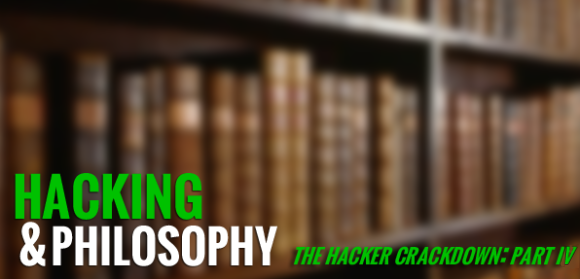
This week we conclude our discussion of The Hacker Crackdown with the final chapter, which covers the rise of the EFF. In early 1990, the idea of civil liberties online was little more than a notion in [John Barlow’s] head, but by the end of the same year, the EFF had formed to not only keep Phrack editor [Knight Lightning] out of prison, but to also successfully challenge the Secret Service on behalf on Steve Jackson Games.
[Sterling] details [Knight Lightning’s] trial in this chapter and it’s worth reading. Had the EFF lost the case, online publications would have suffered serious setbacks in terms of freedom of speech, and sites like ours would likely be considered illegal. Read on, dear reader.
0. From Last Week’s Discussion:
RE: Q1 (Have any of our readers been raided?)
While there were no epic tales of late-night knocks on the door followed by an eruption of hinges and wood, [matt] did share an equally frightening situation at a former job.
RE: Q2 (Should young hackers only aspire toward careers in law enforcement?)
RE: Q3 (Any instances of hacking leading directly to death as predicted in the book?)
Unfortunately neither of these questions received a directly reply. Perhaps someone can chime in this week.
[Macon] and [dan] did, however, provide some excellent comments on open source systems; check them out!
I. What’s important for this week’s discussion?
[Sterling] shines as a storyteller in this chapter, and his inclusion of the actual E911 document in the midst of the court case description makes for a brilliant rebuttal. Above all, however, you’ll want to read this excerpt of an encounter between founding EFF member [John Barlow] and a federal investigator:
Barlow was troubled to find himself under investigation in an area of his interests once quite free of federal attention. He had to struggle to explain the very nature of computer crime to a head-scratching local FBI man who specialized in cattle rustling. [1]
To a lesser extent, this section has led me to reconsidered my position from last week where I criticized [Sterling’s] recommendation that young would-be hackers should all seek out a career in law enforcement. I still believe unforeseen career paths (unforeseen by [Sterling]; he’s writing in 1992 and would need a crystal ball to predict where hacking might go) such as pen testing provide the appropriate alternative option for young hackers. It is, however, frightening to know that those creating the laws, or prosecuting and arresting presumably malicious hackers, likely have limited background in these emerging fields. It will take individuals with a hacker mentality to not only keep pace with developments, but to find appropriate responses to legal gray-area transgressions that avoid abuse and seek fairness for all parties.
II. Questions for this week
1. What parallels, if any, do you see between the information revealed by the defense for [Knight Lighting] and the onslaught of leaks coming from [Snowden] and others? How effective are recent attempts to “get information out in the open?”
2. If this is your first time reading Crackdown, what’s your overall response to it? It doesn’t have to be a formal essay; consider this a survey. Did you like the topic? The writing style? Was this a book you enjoyed discussing (or lurking while others discussed?)
NEXT WEEK:
Well gang, we’ve finished our first book, so take a break from reading this week and instead hit up the comments for some discussion. Next week we will announce a new text and go from there!
NOTES:
[1] Bruce Sterling, The Hacker Crackdown, (New York: Bantam Books, 1992), 236.
Hacking & Philosophy is an ongoing column with several sections:
- October 28th: Hacking & Philosophy: An Introduction
- November 4th: The Mentor’s Manifesto
- November 11th: Sterling’s Hacker Crackdown: Intro & Part I
- November 18th: Sterling’s Hacker Crackdown: Part II
- November 25th: Sterling’s Hacker Crackdown: Part III
- December 2nd: Sterling’s Hacker Crackdown: Part IV
















Please be kind and respectful to help make the comments section excellent. (Comment Policy)